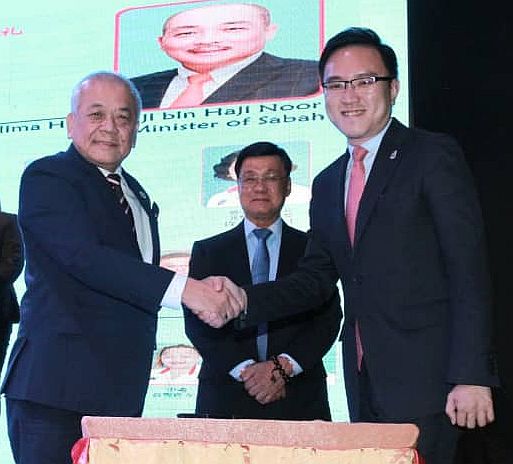KOTA KINABALU: Tan Sri T.C Goh, President of the Federation of Chinese Associations Malaysia (Huazong) and President of the Federation of Chinese Associations Sabah (FCAS), has urged the Federal government and airport authorities to promptly address the pressing issue of inadequate facilities at Tawau Airport, which often caused great inconvenience and dissatisfaction to both domestic and international travelers.
This had often caused long queues at the check in counters, which inevitably led to many passengers missing their flights.
He said the Sabah State government’s continuous efforts to promote tourism in the state, particularly among Chinese tourists, are commendable. He cited for instance, since May this year, Tawau Airport made a breakthrough when it received its first direct flight from China, marking a good start for tourism in Tawau and Semporna. Subsequently, more direct flights from China have followed, adding to the existing domestic and inter-state flights, thus leading to the airport’s current overloaded and overcrowded situation.
He thus emphasized that the Federal Government, especially the airport management company, must ensure that Tawau Airport does not suffer from inadequate facilities, which could undermine the growth of Sabah’s tourism industry.
He also shared the disappointment and frustration of Sabah’s Minister of Tourism, Culture, and Environment, Datuk Christina Liew, regarding the issues at Tawau Airport. He especially supported her statement that if the airport management company cannot effectively manage Tawau Airport, the Sabah State Government should consider taking over to enhance management.
He urged the Federal Government to promptly engage in dialogue with the Sabah State Government and relevant agencies, to understand the details and to work together to effectively resolve the issues, which he believed is the best approach.
Goh, who is also a member of the Sabah Economic Advisory Council (SEAC) made these remarks on Friday, during the 30th-anniversary celebration and the swearing-in ceremony of the 14th Central Committee and various committees of the FCAS, at the Wisma Hakka’s Banquet Hall.
The event was attended by guest of honor, Datuk Seri Hajiji Mohd Noor, who was represented by Datuk Phoong Jin Zhe, Minister of Industrial Development & Entrepreneurship Sabah (MIDE),
special guest Tan Sri Pheng Yin Huah who is also Honorary Life President of Huazong, FCAS Supervisory Chairman Datuk Nancy Ho, and Deputy President Datuk Susan Wong Siew Guen, among others.
Goh pointed out that with the direct flights from Shenzhen, Nanjing, Macau, and Chengdu to Tawau, the airport authorities should have taken proactive measures long ago.
“As an important gateway to the east coast of Sabah, Tawau Airport should significantly upgrade its facilities and manpower, enhance service efficiency, including training ground staff or officers who can speak Chinese to communicate more effectively with Chinese tourists.”
“Especially now that the airport has international direct flights, I call on the Federal Government to immediately allocate funds to upgrade Tawau Airport, including considering providing some duty-free allowances for incoming international tourists, equivalent to those at international airports, to prevent the recent incident of ‘wrongful tariff collection’ at Tawau Airport from happening again,” he urged.
He highlighted that Tawau Airport currently handles 115 flights per week, with a capacity of 20,200 seats, including 58 flights to and from Kuala Lumpur, 4 direct flights to Johor Bahru, and 46 flights to and from Kota Kinabalu. Between January and June this year, there were 32 chartered direct flights from China to Tawau, including 20 from Nanjing and 12 from Guangzhou, with flights also connecting Tawau directly to Macau, Guangzhou, Chengdu, and Nanjing.
“This clearly indicates the busyness and highly congested state of Tawau Airport,” he said.
He further noted that the situation was particularly severe this month, causing numerous instances of congestion at the airport. Some passengers missed their flights, others took two hours to enter the departure hall, some had to sit on the floor due to a lack of seating, and there were also complaints about the poor attitude of ground staff, resulting in significant dissatisfaction among passengers.
He hopes that the Federal Government, through the airport management authorities, will swiftly intervene and rectify the situation, by improving airport facilities, manpower, and security services to ensure that domestic and international passengers no longer have to face long queues.
Phoong: Federal Transport Minister Announces Cabinet Approval for Tawau Airport Upgrade
Meanwhile, in his response to Goh’s concerns about the chaotic and unpleasant situation at Tawau Airport, Phoong said that following his direct phone call to the Federal Transport Minister, Anthony Loke, he was informed that the Federal Cabinet had specially approved the plan to upgrade Tawau Airport’s facilities, and that the project has began the tender process a few weeks ago.
He said that the Ministry of Transport is striving to implement the project by the end of this year.
He added that the Federal Government will also allocate funds for the upgrading and enhancement of Kota Kinabalu International Airport (KKIA).
He noted that domestic tourism, including in Sabah, has returned to pre-pandemic levels or even better, following the implementation of visa-free travel agreement between Malaysia and China, a few months ago.
Phoong also mentioned that, thanks to government efforts, the congestion issues at the state’s ports have been resolved.
Pheng: West Malaysia Should “Learn from the East (Malaysia)
In his speech, Pheng said that the imbalance in infrastructure development between East Malaysia (including Sabah and Sarawak) and West Malaysia, due to various political factors, is regrettable and in need of correction and improvement.
He also acknowledged that the policies of the East Malaysian governments are fairer and more reasonable, with stronger racial and religious harmony, unity among the people, as compared to West Malaysia, and this too should be addressed and improved.
He especially noted that in East Malaysia, there is no issue of extremism and racism among people of different races and faiths, no single-stream education policy, no theocratic governance, and no unnecessary political fracas.
“There are many areas in governance and policy implementation where West Malaysia or the Federal Government should ‘learn from the East.’ By ‘East,’ I mean Sabah and Sarawak,” he said.
He said, the annual grants provided by the Sabah State Government to the Chinese community or non-Muslim organizations in various sectors are worthy of emulation by state governments in West Malaysia. This year alone, the total amount of these grants reached RM 56.75 million, benefiting all nine independent Chinese schools in the state, which the Chinese community was greatly motivated and appreciative of.
“In contrast, some state governments in West Malaysia have yet to provide annual or institutionalized grants for non-Muslim communities or related sectors, including independent Chinese schools, Chinese schools, and non-Muslim religious places and activities, which is rather puzzling and regrettable. Moreover, some state governments in West Malaysia have even introduced religious elements into their governance, leading to increasingly conservative policies, causing unease and dissatisfaction among non-Muslim communities,” he lamented.
Pheng was also glad to note that the Chinese communities and associations in East Malaysia, including Sabah, are well united. Through solidarity, they have amplified the voice and influence of the Chinese community and associations, earning the attention and respect of the state government.
“This includes the Federation of Chinese Associations Sabah and Tan Sri T.C Goh, who have maintained close and harmonious relations with the state government and various departments over the years. Goh himself has been appointed as an economic advisor to the state government, providing very proactive and forward-thinking services and playing an extremely important role,” he acknowledged.


